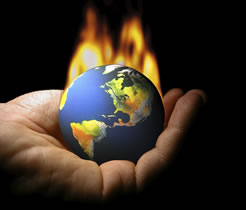WEIRD WEATHER IS THE NEW NORMAL
The extremes of weather in the United States are signs of a new normal, says a group of scientists and government planners.
'It's a new normal and I really do think that global-weirding is the best way to describe what we're seeing,' says climate-scientist Katharine Hayhoe of Texas Tech University.
Full story at
NewsDaily.
Friday 20 May 2011
Thursday 12 May 2011
REMOVAL OF C02 FROM AIR NOT VIABLE
Technologies for removing carbon dioxide from the atmosphere are unlikely to offer an economically feasible way to slow human-driven climate change for several decades, according to a new report. The American Physical Society has released a new assessment -- Direct Air Capture (DAC) of CO2 with Chemicals -- to better inform the scientific community on the technical aspects of removing carbon dioxide from the atmosphere.
Robert Socolow, a professor of mechanical and aerospace engineering at Princeton University, who served as a co-chair of the DAC study, said, "We humans should not kid ourselves that we can pour all the carbon dioxide we wish into the atmosphere right now and pull it out later at little cost."
Full report on ScienceDaily.
Technologies for removing carbon dioxide from the atmosphere are unlikely to offer an economically feasible way to slow human-driven climate change for several decades, according to a new report. The American Physical Society has released a new assessment -- Direct Air Capture (DAC) of CO2 with Chemicals -- to better inform the scientific community on the technical aspects of removing carbon dioxide from the atmosphere.
Robert Socolow, a professor of mechanical and aerospace engineering at Princeton University, who served as a co-chair of the DAC study, said, "We humans should not kid ourselves that we can pour all the carbon dioxide we wish into the atmosphere right now and pull it out later at little cost."
Full report on ScienceDaily.
Wednesday 11 May 2011
ALGAE STARING DOWN THE CO2 BARREL
New research shows that coccoliths, an important part of the marine environment, dissolve when seawater acidifies, which means that acidification of the world's oceans could have major consequences for the marine and global environments. Experiments show that coccoliths fall apart at the pH levels expected in 2100. Full story at ScienceDaily.
New research shows that coccoliths, an important part of the marine environment, dissolve when seawater acidifies, which means that acidification of the world's oceans could have major consequences for the marine and global environments. Experiments show that coccoliths fall apart at the pH levels expected in 2100. Full story at ScienceDaily.
Thursday 5 May 2011
ARCTIC MELTING AND RAISING SEA FASTER
A much reduced covering of snow, shorter winter season and thawing tundra: the effects of climate change in the Arctic are already here, and are taking place significantly faster than previously thought--the conclusions of new research report on the Arctic, presented in Copenhagen this week. 'The changes are dramatic, not coincidental; the trends are unequivocal and deviate from the norm.' See ScienceDaily.
On top of that, a new study is projected a rise of up to 1.6 meters in global sea-levels by 2100, due to accelerating climate-change in the Arctic and the melting of Greenland's icecap.
A much reduced covering of snow, shorter winter season and thawing tundra: the effects of climate change in the Arctic are already here, and are taking place significantly faster than previously thought--the conclusions of new research report on the Arctic, presented in Copenhagen this week. 'The changes are dramatic, not coincidental; the trends are unequivocal and deviate from the norm.' See ScienceDaily.
On top of that, a new study is projected a rise of up to 1.6 meters in global sea-levels by 2100, due to accelerating climate-change in the Arctic and the melting of Greenland's icecap.
Subscribe to:
Posts (Atom)

